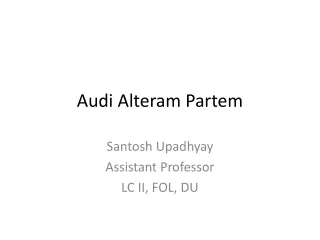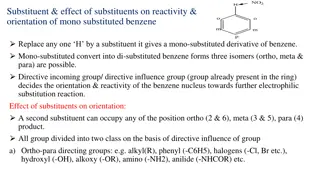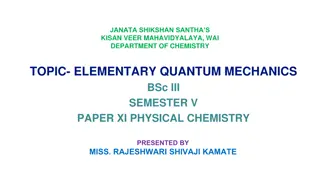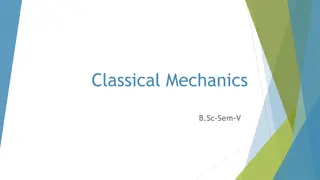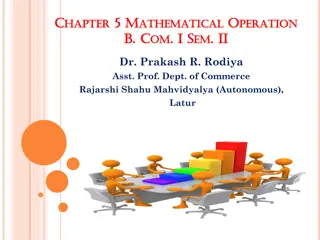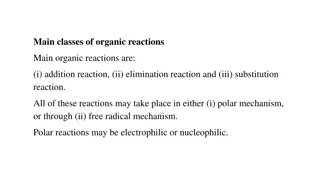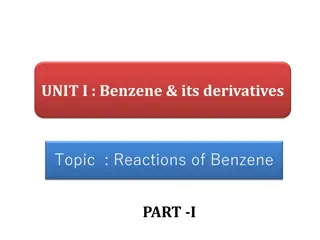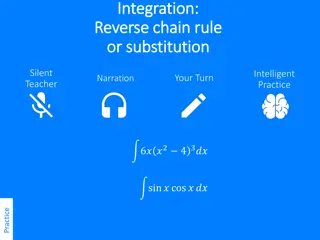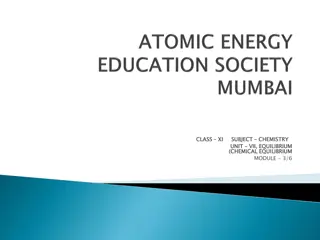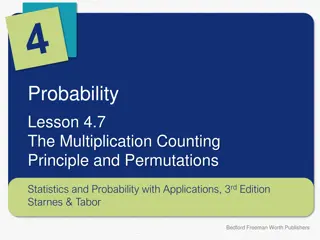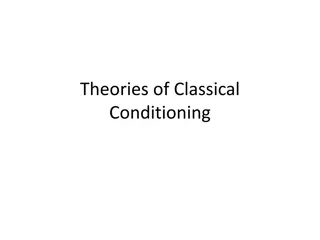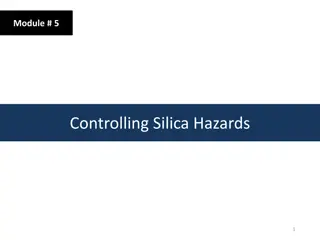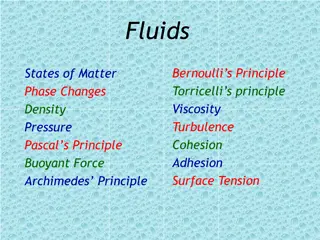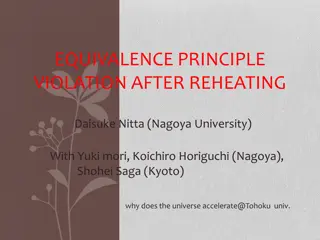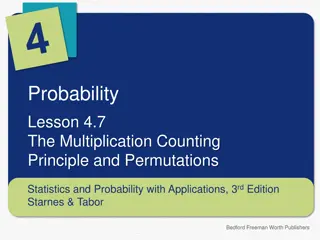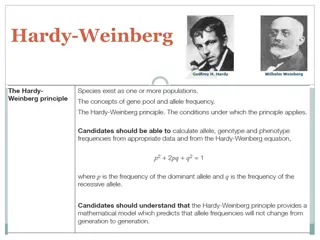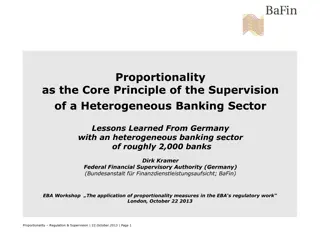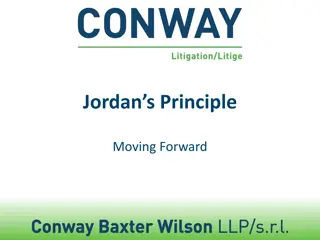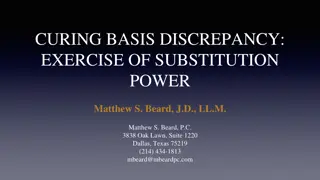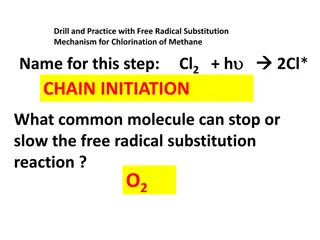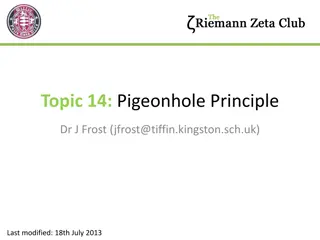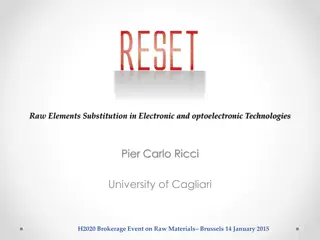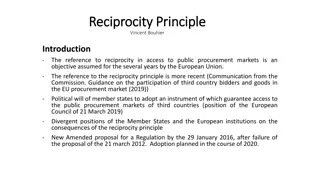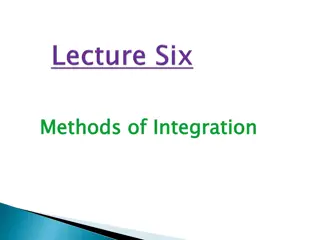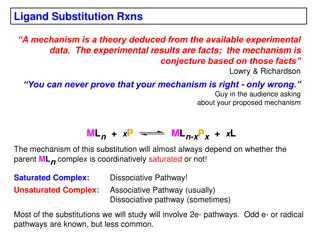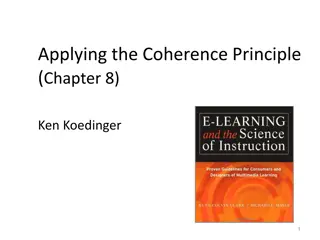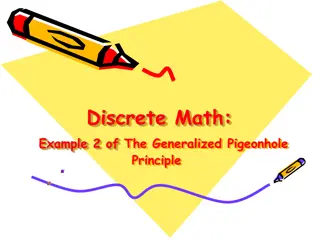Audi Alteram Partem
Explore the fundamental concept of fairness and justice in human society through the principle of Audi Alteram Partem, which ensures that both sides are heard before passing a judgement. This principle is a basic requirement of the rule of law and is essential for upholding civilised society.
1 views • 35 slides
Understanding Carcinogens in the Workplace
Carcinogens in the workplace pose a significant risk to workers, leading to a high number of cancer diagnoses and deaths each year. Employers must take responsibility for protecting their workers by implementing proper measures to minimize exposure to these harmful substances. The STOP principle, wh
1 views • 11 slides
Understanding Boat Floatation with Archimedes Principle
Explore the concept of why boats float using Archimedes' principle, which explains the relationship between density, volume, and buoyancy. Discover how objects sink or float based on their density relative to water, and experience a hands-on investigation to witness these principles in action.
5 views • 11 slides
Module C1:Material substitution.
Explore the concept of material substitution in the context of circular economy principles for energy storage. Understand the importance of material availability, limitations of secondary raw materials in energy applications, and classification of energy conversion and supportive materials. Discover
5 views • 16 slides
Substituent Effects on Benzene Reactivity and Orientation
Substituents in benzene derivatives influence reactivity and orientation in electrophilic substitution reactions. They can be classified as ortho-para directing or meta directing based on their effect. Ortho-para directing groups increase electron density and activate the ring, while meta directing
7 views • 14 slides
Heisenberg's Uncertainty Principle in Elementary Quantum Mechanics
Heisenberg's Uncertainty Principle, proposed by German scientist Werner Heisenberg in 1927, states the impossibility of simultaneously and accurately determining the position and momentum of microscopic particles like electrons. This principle challenges classical concepts of definite position and m
0 views • 49 slides
Counting Principles and Pigeonhole Principle Explained
Explore the concepts of counting principles and the pigeonhole principle through practical examples and tips. Learn how to apply these principles to solve problems effectively. From understanding basic counting rules to the advanced pigeonhole principle, this content provides insights and guidance o
2 views • 35 slides
Understanding Classical Mechanics: Variational Principle and Applications
Classical Mechanics explores the Variational Principle in the calculus of variations, offering a method to determine maximum values of quantities dependent on functions. This principle, rooted in the wave function, aids in finding parameter values such as expectation values independently of the coor
1 views • 16 slides
Mastering Symbol Substitution in Mathematical Operations
In the realm of mathematical operations, understanding symbol substitution is key to solving questions efficiently. Learn how to interchange mathematical signs and symbols to find the correct answer. With examples and guidance, grasp the concept of symbol substitution and excel in tackling such ques
0 views • 25 slides
Overview of Organic Reactions and Mechanisms
Organic reactions can be categorized into addition, elimination, and substitution reactions, occurring through either polar or free radical mechanisms. Polar reactions may be electrophilic or nucleophilic, while free radical reactions involve radicals reacting to complete electron octets. Different
2 views • 26 slides
Understanding Benzene and its Electrophilic Aromatic Substitution Reactions
Aromatic compounds like benzene undergo electrophilic aromatic substitution reactions (EAS). This process involves the reaction of an electrophile with the aromatic ring, leading to the formation of various derivatives. Examples include halogenation, nitration, and sulphonation of benzene, each with
0 views • 13 slides
Integrating Reverse Chain Rule and Substitution in Calculus
Explore the concepts of reverse chain rule and substitution in integration through worked examples and practice questions involving trigonometric functions. Enhance your skills with interactive narration and practical exercises. Dive into the world of calculus with a silent teacher guiding you throu
0 views • 5 slides
Understanding Le Chatelier's Principle in Chemical Equilibrium
Le Chatelier's Principle states that when a system at equilibrium is disturbed by changes in concentration, temperature, or pressure, the equilibrium shifts to counteract the change. This principle can be applied to predict the direction of equilibrium when changes occur. Changes in concentration, p
0 views • 10 slides
Understanding the Multiplication Counting Principle in Probability
The Multiplication Counting Principle and Permutations play a crucial role in determining the number of possible outcomes in various processes. This lesson covers how to use factorials to count permutations, compute arrangements of individuals, and apply the multiplication counting principle to dete
0 views • 14 slides
Understanding Jordan's Principle and Its Impact on First Nations and Inuit Children in Canada
Jordan's Principle was named in memory of Jordan River Anderson, a young boy whose tragic story led to the establishment of a legal requirement ensuring access to services for First Nations and Inuit children in Canada without delays or disruptions. This principle aims to prevent situations where ch
0 views • 9 slides
Theories of Classical Conditioning: Critical Concepts and Pavlov's Stimulus Substitution Theory
Understand the key aspects of classical conditioning, including the critical CS-US relationship and Pavlov's Stimulus Substitution Theory. Explore why organisms respond predictably, uncover criticisms and flaws in the theory, and delve into the bigger problem of selecting for certain conditioned res
0 views • 75 slides
Controlling Silica Hazards: Effective Engineering Controls
Techniques for controlling silica hazards in the workplace include elimination, substitution, and engineering controls like ventilation, dust containment systems, wet methods, and housekeeping practices. Elimination involves removing silica exposure risks, while substitution replaces risky materials
1 views • 21 slides
Understanding Fluids, States of Matter, and Phase Changes
Exploring key concepts in physics including Bernoulli's Principle, viscosity, cohesion, states of matter (solid, liquid, gas, plasma), phase changes (evaporation, condensation, etc.), density, pressure, and more. Discover the properties and behaviors of fluids in relation to gases and liquids, along
1 views • 54 slides
Enhancing Automation Efficiency through Substitution Variables
The University of Tennessee Health Science Center implemented automation in Financial Aid processes to reduce workload and improve efficiency. Learn how substitution variables, notifications, and PL/SQL procedures were utilized to streamline operations in this insightful session.
0 views • 35 slides
Understanding the Acceleration of the Universe and the Equivalence Principle Violation in the Horndeski Vector-Tensor Theory
Exploring the implications of the Equivalence Principle Violation after reheating in the context of the accelerated expansion of the universe. The study delves into the Horndeski vector-tensor theory, gravitational waves, and the impact of modified gravity and dark energy. Insights are provided on t
2 views • 20 slides
The Multiplication Counting Principle in Probability: Exploring Permutations
Exploring the multiplication counting principle in probability, this lesson delves into determining the number of ways to complete a process involving multiple steps. Using factorials for permutations, the content showcases how to compute permutations of individuals taken at a time. Through examples
0 views • 20 slides
AQS Data Handling: Insights from AQS Conference August 2012
Delve into the intricacies of AQS data handling discussed at the AQS Conference in August 2012. Explore topics such as sample measurement rules, MDL substitution, rounding methods, acceptance/rejection criteria, standard value calculation, and more. Gain insights into the importance of data complete
0 views • 12 slides
Understanding Hardy-Weinberg Principle and Genetic Frequencies
Gene pool and allele frequencies play a crucial role in the Hardy-Weinberg Principle, a mathematical model predicting allele frequencies over generations. The principle outlines conditions like a large population, absence of mutations, random mating, and more. Equations such as p² + 2pq + q² = 1 h
0 views • 44 slides
Understanding Transition Bias and Substitution Models in Genetics
Transition bias and substitution models, explored by Xuhua Xia, delve into the concepts of transitions and transversions in genetic mutations, the causes of transition bias, the ubiquitous nature of transition bias in invertebrate and vertebrate genes, the mitochondrial genetic code, and RNA seconda
1 views • 25 slides
Principle of Majority Rule in Company Law
The principle of majority rule is a fundamental aspect of company law, where the powers of control over a company rest with the general meeting representing the majority shareholders. This principle emphasizes that decisions are made by a simple or special majority vote, except for powers vested in
0 views • 9 slides
Proportionality as Core Principle in Supervising Heterogeneous Banking Sectors: Lessons from Germany
The supervision of a diverse banking sector, such as Germany's with roughly 2,000 banks, is based on the core principle of proportionality. This approach involves tailoring regulations and oversight to fit the individual characteristics of each institution, focusing on qualitative aspects, organizat
0 views • 8 slides
Jordan's Principle: Advocating for First Nations Children's Rights
Jordan's Principle is a vital advocacy tool aimed at ensuring equitable access to necessary services for First Nations children, emphasizing prompt resolution of jurisdictional disputes. Originating from the story of Jordan River Anderson, its implementation has faced challenges and legal battles. C
0 views • 21 slides
Understanding Substitution Power in Trusts: A Comprehensive Analysis
This document delves into the intricacies of substitution power in trust administration, discussing its significance, typical features, and implications. It covers the structure of substitutions, fiduciary duties, valuation considerations, documentation requirements, and scenarios involving refusal
0 views • 16 slides
Free Radical Substitution Mechanism in Methane Chlorination
Explore the detailed steps of the free radical substitution mechanism in the chlorination of methane, including chain initiation, propagation, and termination. Learn about the role of common molecules like O2 in slowing or stopping the reaction and discover how radical-radical recombination reaction
0 views • 10 slides
Understanding the Pigeonhole Principle in Mathematics
The Pigeonhole Principle, demonstrated through examples and explanations by Dr. J. Frost, illustrates the concept that if you have more "pigeons" than "holes," then at least one "hole" must contain multiple "pigeons." This fundamental principle is essential in solving various mathematical problems i
0 views • 27 slides
Raw Elements Substitution in Electronic and Optoelectronic Technologies Overview
Explore the advancements in raw elements substitution in electronic and optoelectronic technologies led by Pier Carlo Ricci from the University of Cagliari, focusing on key applications, research areas, and industry impacts. The project, coordinated by RESET, aims to enhance sustainability and innov
0 views • 12 slides
Understanding Specification Strength and Substitutability
Specifications in software development play a crucial role in determining the strength of requirements and the ability to substitute implementations. This content discusses how stronger specifications imply weaker ones, the importance of satisfaction in specifications, and the application of the Lis
0 views • 42 slides
Understanding the Reciprocity Principle in Public Procurement Markets
The concept of reciprocity in access to public procurement markets, particularly in the European Union, has gained prominence in recent years. This principle involves mutual opening obligations for public procurement markets while considering concessions and exceptions, such as excluding defense and
0 views • 4 slides
Methods of Integration and Trigonometric Substitution
Explore methods of integration including integration by parts and trigonometric substitution. Learn how to apply these techniques to solve integrals involving logarithmic, trigonometric, and rational functions. Discover step-by-step processes and identities to simplify and evaluate various types of
0 views • 7 slides
Writing Lab: Principal vs. Principle
Learn the differences between "principal" and "principle" with this informative Writing Lab mini-lesson. Understand their varied meanings as nouns and adjectives, and how they are used in different contexts. Enhance your diction skills and avoid common usage errors. Enjoy learning about the principa
0 views • 4 slides
Understanding Ligand Substitution Reactions in Metal Complexes
Ligand substitution reactions in metal complexes involve the replacement of one ligand with another, impacting the coordination around the metal center. The mechanism of these reactions, associative or dissociative, is influenced by factors like coordination saturation and electron count. Experiment
0 views • 20 slides
Understanding Space-for-Time Substitution in Community Ecology
Space-for-time substitution (SFT) is a method used to study slow ecological processes by assuming different sites are at various stages of development. This approach, famous for its role in ecological development, has been critiqued for its implicit use in testing hypotheses on ecological processes
0 views • 7 slides
Enhancing Student Learning Through Coherence Principle
The Coherence Principle emphasizes the importance of excluding extraneous, entertaining materials to improve student learning. Including such materials can compete for cognitive resources and divert attention from essential information. Utilizing simpler visuals and avoiding websites that violate th
0 views • 7 slides
COVID-19 Testing Supply Substitution Strategies Overview
This resource provides validated supply alternatives for labs conducting authorized COVID-19 tests to address availability concerns during the pandemic. It covers strategies for substitution of components in Real-time RT-PCR testing, specimen collection techniques, and acceptable swab and media choi
0 views • 22 slides
Understanding the Generalized Pigeonhole Principle in Discrete Math
The Generalized Pigeonhole Principle is illustrated through an example involving selecting cards from a deck. By strategically grouping the cards, we determine the minimum number needed to guarantee at least three cards of the same suit are chosen. Additionally, the process is applied to finding the
1 views • 5 slides
